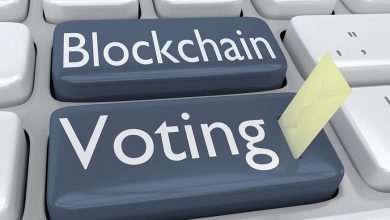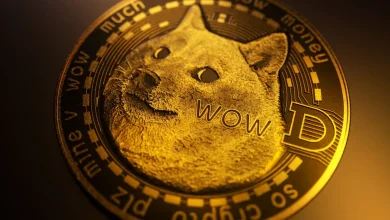Decentralized Finance: Real Impact or Just Hype?
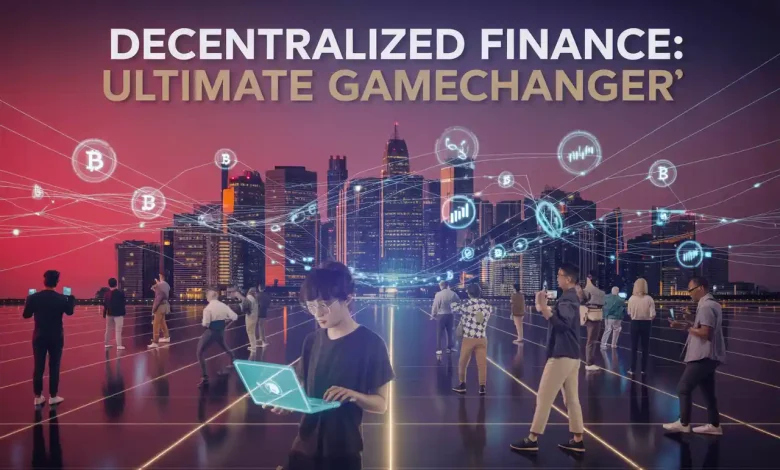
INTRODUCTION
Decentralized Finance, or DeFi, is not just a buzzword—it is a groundbreaking shift that is redefining the entire world of money and financial services. For decades, traditional banks and financial institutions have controlled how people save, borrow, invest, and transfer funds. These systems often require paperwork, approvals, and trust in third parties. But DeFi is changing all of that by using blockchain technology and smart contracts to build a new, open financial system that anyone can join.
Imagine a world where you can send money across borders in seconds, earn interest on your savings without a bank, or borrow funds instantly without filling out forms or waiting for approval. With Decentralized Finance, these possibilities are becoming reality.
DeFi platforms run 24/7, do not close for holidays, and are available to anyone with an internet connection and a digital wallet. This means people in countries with unstable economies or limited banking options, like many in Africa and Asia, can now access global financial services that were once out of reach.

What makes Decentralized Finance truly powerful is its transparency and fairness. Every transaction, rule, and contract is visible to all on the blockchain, so users can trust the system without needing to trust a single company or government. Developers around the world are building new DeFi apps every day, offering everything from trading and lending to insurance and fundraising. This wave of innovation is unlocking new ways for people to grow their wealth, protect their assets, and take control of their financial future—no matter where they live or how much money they have.
As DeFi continues to grow, it is attracting not just individuals but also businesses, investors, and even governments who see its potential to make finance faster, cheaper, and more inclusive. The rise of Decentralized Finance marks the beginning of a new era where financial freedom and opportunity are open to everyone, everywhere, with just a few clicks.
Decentralized Finance What Is It
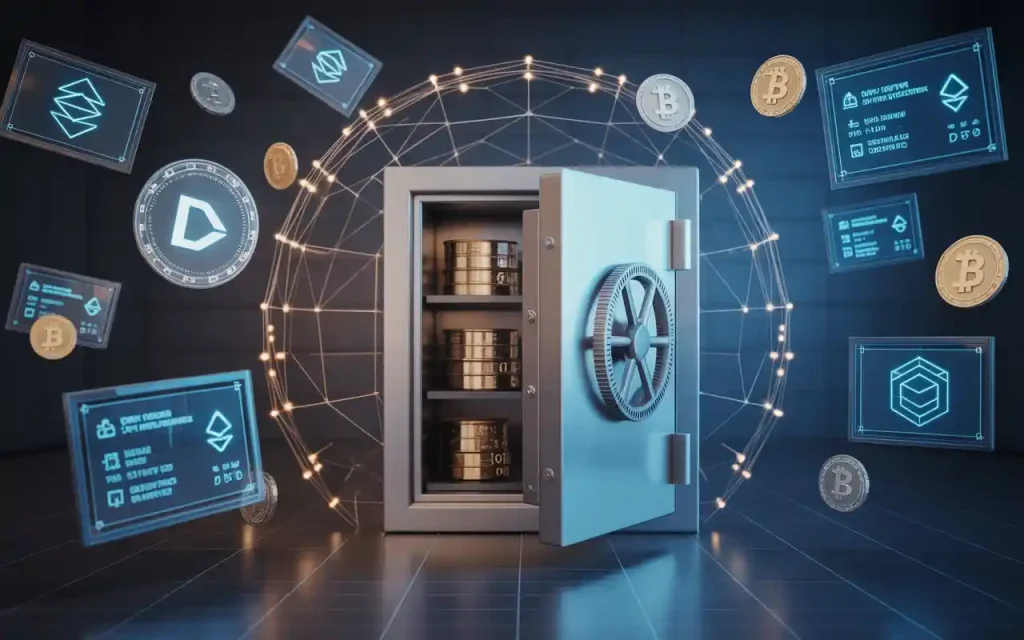
Decentralized Finance is a new way to use financial services without banks or traditional financial institutions. In DeFi, all activities like lending, borrowing, trading, saving, and investing happen on blockchain networks. The most popular blockchain for DeFi is Ethereum, but others like Binance Smart Chain and Solana are also used.
How Decentralized Finance Works:
- Smart contracts: These are self-running computer programs that automatically carry out actions when certain rules are met. For example, if you lend money on a DeFi platform, a smart contract makes sure you get your interest automatically.
- Decentralized apps (dApps): These are online platforms that let you use DeFi services. You can access them with just a digital wallet, no need for a bank account.
- Digital wallets: You control your own money through wallets like MetaMask, Trust Wallet, or hardware wallets. Only you have the keys to your funds.
Why DeFi is Different:
- No single company or government controls DeFi platforms.
- All transactions are open and can be checked by anyone on the blockchain.
- You can use DeFi from anywhere in the world, 24/7.
Decentralized Finance Key Features
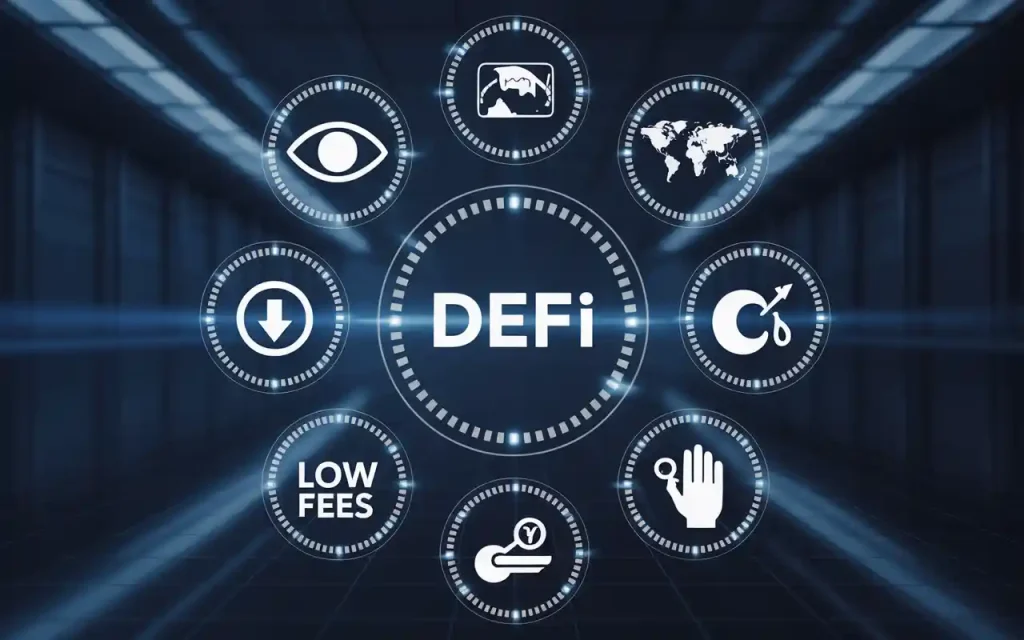
Permissionless Access:
Anyone can use DeFi platforms. You do not need permission from a bank or government. All you need is internet and a digital wallet.
Transparency:
Every transaction, rule, and smart contract is visible on the blockchain. This makes it easy to check how everything works and helps build trust.
Programmability:
Developers can create new financial products and services using smart contracts. This means DeFi is always growing with new ideas like flash loans, automated trading, and more.
Lower Costs:
DeFi cuts out middlemen like banks, so fees are usually much lower. You keep more of your money.
Global Reach:
DeFi is open to everyone, even people in countries where banks are hard to reach. This helps people in Africa, Asia, and Latin America join the global economy.
Full Control:
You are in charge of your own money. There is no bank that can freeze your account or block your transactions.
Decentralized Finance Popular Use Cases
| Use Case | Description |
|---|---|
| Decentralized Exchanges | Platforms like Uniswap and PancakeSwap let you trade cryptocurrencies directly with others. There is no central authority. You keep control of your funds. |
| Lending and Borrowing | Platforms like Aave and Compound allow you to lend your crypto and earn interest, or borrow by providing collateral. No credit checks or paperwork. |
| Yield Farming | You can earn extra rewards by providing liquidity to DeFi protocols. This means you help the platform run smoothly and get paid for it. |
| Staking | Lock your crypto in a platform to help secure the network and earn rewards. Many DeFi projects offer staking options. |
| Asset Management | DeFi lets you manage and grow your digital assets with more flexibility. You can use automated tools to balance your portfolio or protect against losses. |
| Fundraising | Projects can raise money directly from users using DeFi platforms. This is called an Initial DEX Offering (IDO) or token sale. |
| NFTs and Gaming | DeFi is used in games and for trading NFTs (digital collectibles). You can earn, buy, sell, and use NFTs in DeFi apps. |
| Insurance | Get decentralized insurance for your assets and activities. Platforms like Nexus Mutual offer coverage for DeFi risks. |
| Prediction Markets | Bet on the outcome of events like elections or sports games using DeFi-powered prediction platforms. |
Decentralized Finance How It Works
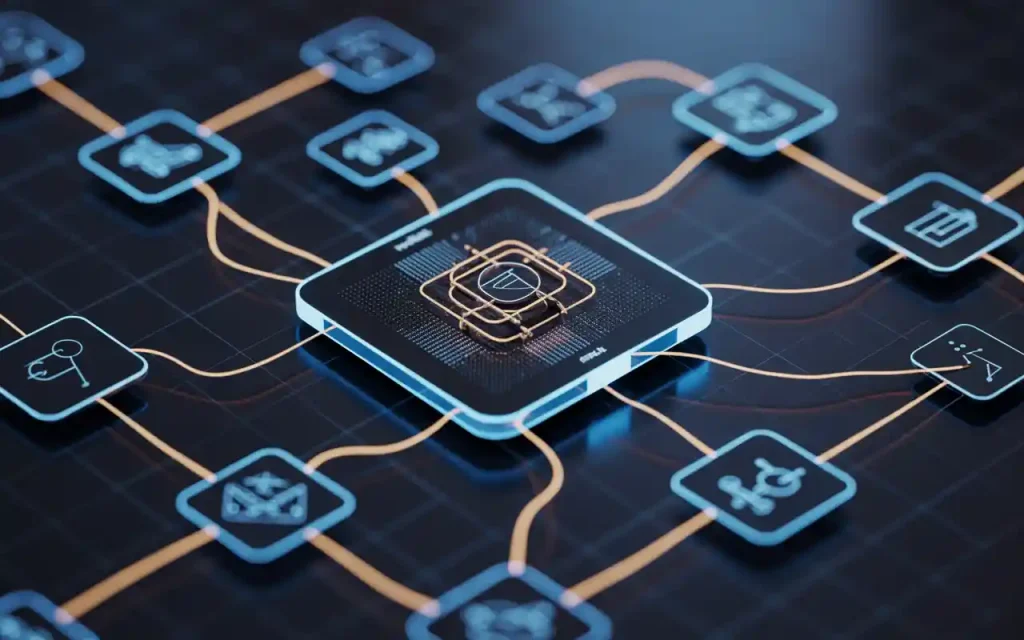
1. Smart Contracts:
Smart contracts are the heart of DeFi. They are pieces of code that run on the blockchain and do exactly what they are programmed to do. For example, if you lend money, the smart contract makes sure you get paid back with interest.
2. Decentralized Apps (dApps):
These are websites or apps that let you use DeFi services. You connect your wallet and interact directly with the blockchain. There are dApps for trading, lending, borrowing, saving, and more.
3. Liquidity Pools:
Many DeFi platforms use liquidity pools. Users deposit their crypto into these pools, which are then used for trading or lending. In return, users earn a share of the fees or rewards.
4. Oracles:
Oracles are tools that bring real-world data, like prices, into the blockchain. This helps DeFi apps work with accurate information.
5. Governance Tokens:
Some DeFi projects give users special tokens that let them vote on changes to the platform. This makes the system more democratic.
Real-World Impact

Financial Inclusion:
DeFi is helping millions of people who do not have access to banks. In Africa, many people use DeFi to save, borrow, or send money, even if they do not have a bank account.
Empowerment:
With DeFi, you control your own money. No one can freeze your account or block your transactions. This is important in countries with unstable banks or strict financial rules.
Innovation:
DeFi is creating new financial products every day. There are now DeFi apps for trading, lending, insurance, real estate, and even art. Developers are building tools that were not possible before.
Institutional Adoption:
Banks and investment funds are starting to use DeFi for things like payments, collateral management, and asset tokenization. Some governments are even testing DeFi for public services.
Market Growth:
DeFi has grown from a small idea to a huge industry with billions of dollars locked in DeFi platforms. Millions of people use DeFi every day, and the number is growing fast.
Case Example:
In Nigeria, many young people use DeFi apps to save in stablecoins, avoiding the risks of local currency inflation. This helps protect their savings and gives them new ways to earn money.
Decentralized Finance Risks and Challenges

Security Risks:
Smart contracts can have bugs or be hacked. If a hacker finds a weakness, they can steal money from the platform. Always use trusted DeFi apps and never invest more than you can afford to lose.
Regulation:
DeFi operates outside most government rules. This can be good for freedom but risky if something goes wrong. Some countries are starting to regulate DeFi, which could change how it works.
User Error:
You are responsible for your own wallet and keys. If you lose your keys, you lose your money. There is no customer support to help you recover lost funds.
Volatility:
Crypto prices can change very quickly. You can make big profits, but you can also lose money fast. Always be careful and understand the risks.
Scams and Fraud:
Some DeFi projects are fake or poorly designed. Always do your own research before investing. Look for reviews, audits, and a strong community.
Governance Issues:
Some DeFi projects are controlled by a small group of people or big investors. This can limit true decentralization and make the system less fair.
Decentralized Finance Trends in 2025

AI Integration:
DeFi platforms are starting to use artificial intelligence for smarter trading, risk management, and fraud detection. AI can help users make better decisions and protect their money.
Cross-Chain Access:
Users can now move assets between different blockchains more easily. This makes DeFi more flexible and powerful, allowing you to use the best features of each network.
Real-World Assets:
DeFi is expanding to include things like real estate, company shares, and government bonds. This means you can invest in real-world assets using DeFi platforms.
Regulation:
Governments are beginning to create clearer rules for DeFi. This could help protect users but may also limit some freedoms and innovation.
User Growth:
Over 213 million people are expected to use DeFi by 2026. Africa and Asia are leading the way, with millions of new users joining every year.
Sustainability:
Some DeFi projects are focusing on green finance, using blockchain to support environmental projects and sustainable investments.
Case Studies
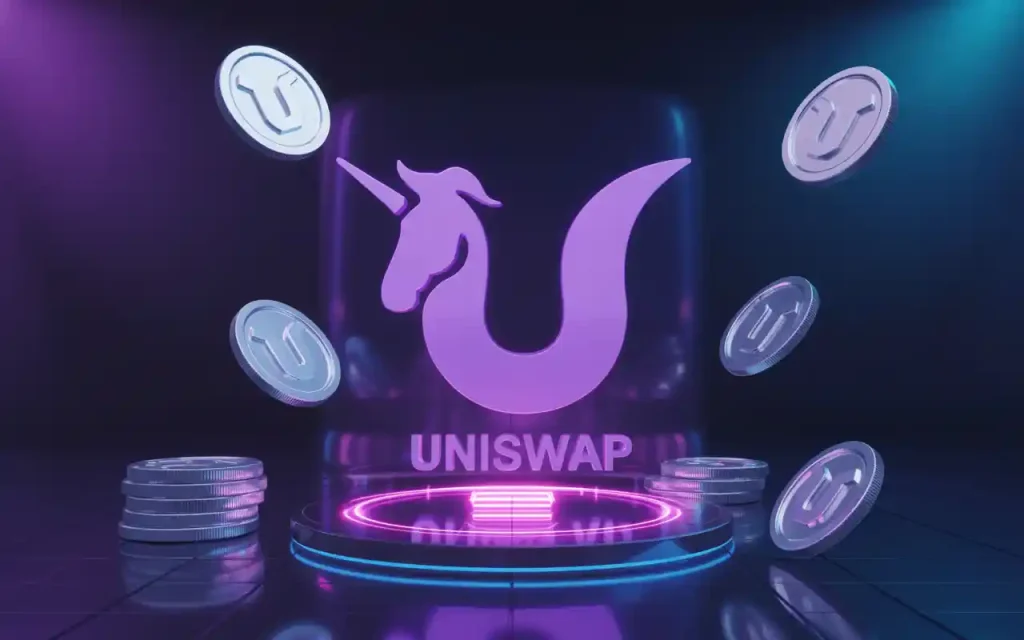
Uniswap:
Uniswap is a leading decentralized exchange. It lets users trade tokens directly without a central authority. Its simple design and strong security have made it a model for other DeFi projects. Uniswap has processed billions of dollars in trades and is trusted by millions of users worldwide.
Aave:
Aave is a top lending platform where users can borrow or lend crypto assets and earn interest. Aave is known for its flexibility, wide range of supported tokens, and community-driven governance. It has introduced features like “flash loans” that let users borrow instantly and repay in the same transaction.
Compound:
Compound is another major lending protocol. It rewards users for supplying liquidity and allows community voting on platform changes. Compound has helped drive the growth of DeFi lending and borrowing.
PancakeSwap:
Popular on the Binance Smart Chain, PancakeSwap offers low fees and fast transactions. It is a favorite among DeFi users in emerging markets because it is easy to use and supports many tokens.
Chainlink:
Chainlink provides secure connections between blockchains and real-world data. This makes DeFi apps smarter and more reliable. Chainlink is used by many top DeFi projects to get accurate price information and other data.
Quotes
- “Decentralized Finance is not just a trend. It is a revolution that is giving power back to the people and making finance more open and fair for everyone.”
- “Imagine a world where you can send money across borders in seconds, earn interest on your savings without a bank, or borrow funds instantly without filling out forms or waiting for approval.”
- “With Decentralized Finance, these possibilities are becoming reality.”
- “The rise of Decentralized Finance marks the beginning of a new era where financial freedom and opportunity are open to everyone, everywhere, with just a few clicks.”
Highlighted Points of the Article
- Decentralized Finance (DeFi) is a new financial system built on blockchain technology and smart contracts, allowing anyone to access financial services without banks or intermediaries.
- DeFi platforms are open 24/7, borderless, and available to anyone with an internet connection and a digital wallet.
- Key features of DeFi include permissionless access, transparency, programmability, lower costs, global reach, and user control over funds.
- Popular DeFi use cases are decentralized exchanges, lending and borrowing, yield farming, staking, asset management, fundraising, NFTs, insurance, and prediction markets.
- DeFi empowers users, promotes financial inclusion, and drives innovation by enabling new financial products and services.
- Real-world impact is seen especially in emerging markets, where people use DeFi to protect their savings from inflation and access global financial opportunities.
- Risks and challenges of DeFi include security vulnerabilities, regulatory uncertainty, user error, market volatility, scams, and governance issues.
- Trends shaping DeFi in 2025 include AI integration, cross-chain access, tokenization of real-world assets, increased regulation, rapid user growth, and focus on sustainability.
- Case studies like Uniswap, Aave, Compound, PancakeSwap, and Chainlink show how DeFi platforms are transforming trading, lending, and data integration.
- DeFi is not just hype—it is a fast-growing, innovative system that is changing how the world uses money and is likely to become a key part of the global financial system.
These quotes and key points capture the essence and impact of Decentralized Finance as discussed in the article.
Frequently Asked Questions
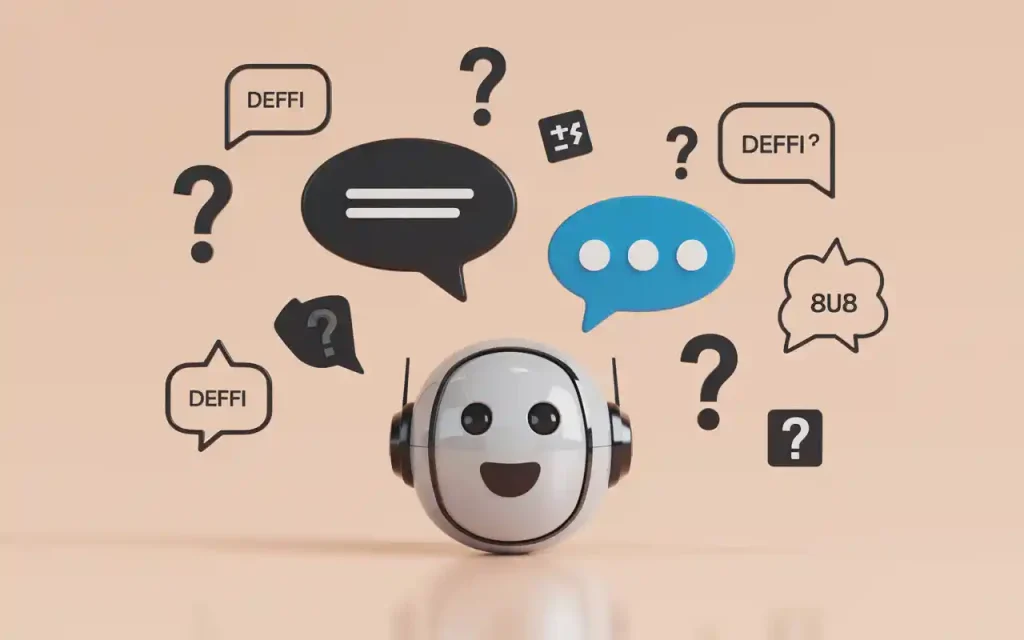
Q: Can anyone use DeFi?
A: Yes, anyone with internet and a crypto wallet can access DeFi services. There are no restrictions based on location, age, or background.
Q: Is DeFi safe?
A: DeFi offers more control, but users must be careful. Always research platforms, use secure wallets, and never invest more than you can afford to lose.
Q: How do I start with DeFi?
A: Create a digital wallet, buy some cryptocurrency, and connect to a trusted DeFi app. Start small and learn as you go.
Q: What are the main risks in DeFi?
A: Risks include hacks, scams, price volatility, and user mistakes. Always use secure wallets and trusted platforms.
Q: Can DeFi replace banks?
A: DeFi offers many of the same services as banks, but it is still new and faces challenges. It may not fully replace banks, but it will change how people use money.
Q: What is a smart contract?
A: A smart contract is a computer program that runs on the blockchain and automatically carries out actions when certain rules are met.
Q: What is yield farming?
A: Yield farming is earning extra rewards by providing liquidity to DeFi platforms. You help the platform run and get paid for it.
Decentralized Finance Future Outlook
The future of Decentralized Finance is bright and full of possibilities. As technology improves and more people learn about DeFi, we can expect even more powerful apps and services. DeFi is likely to become a key part of the global financial system, offering new opportunities for investment, savings, and innovation.
CONCLUSION
Decentralized Finance is not just hype. It is a fast-growing, innovative system that is changing how the world uses money. While there are risks, DeFi is opening new doors for financial freedom, inclusion, and opportunity—making it a true gamechanger for the digital age.



